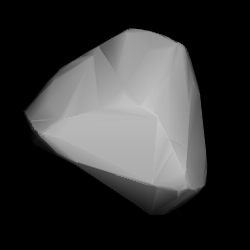1356 Nyanza, provisional designation 1935 JH, is a dark asteroid from the background population of the outer asteroid belt, approximately 63 kilometers in diameter. It was discovered on 3 May 1935, by South-African astronomer Cyril Jackson at the Union Observatory in Johannesburg.[11] The asteroid was named for the former Nyanza Province in Kenya, Africa.[2]
 Modelled shape of Nyanza from its lightcurve | |
| Discovery[1] | |
|---|---|
| Discovered by | C. Jackson |
| Discovery site | Johannesburg Obs. |
| Discovery date | 3 May 1935 |
| Designations | |
| (1356) Nyanza | |
Named after | Nyanza Province[2] (former province of Kenya) |
| 1935 JH · 1929 EL 1929 JH · 1929 JJ 1931 TB3 | |
| main-belt · (outer)[3] background[4] | |
| Orbital characteristics[1] | |
| Epoch 4 September 2017 (JD 2458000.5) | |
| Uncertainty parameter 0 | |
| Observation arc | 86.06 yr (31,435 days) |
| Aphelion | 3.2359 AU |
| Perihelion | 2.9288 AU |
| 3.0823 AU | |
| Eccentricity | 0.0498 |
| 5.41 yr (1,977 days) | |
| 307.99° | |
| 0° 10m 55.56s / day | |
| Inclination | 7.9461° |
| 69.627° | |
| 302.27° | |
| Physical characteristics | |
| Dimensions | 60.078±0.289 km[5] 60.895±0.757 km[6] 61.05±20.58 km[7] 62.46±0.89 km[8] 64.59 km (derived)[3] 64.73±5.1 km[9] |
| 12.422±0.006 h[10] | |
| 0.0352 (derived)[3] 0.04±0.02[7] 0.0462±0.008[9] 0.050±0.002[8] 0.052±0.007[6] 0.0537±0.0090[5] | |
| P[5] · C (assumed)[3] | |
| 9.90[5][8][9] · 10.20[1][3][7] | |
Orbit and classification edit
Nyanza is a non-family asteroid of the main belt's background population.[4] It orbits the Sun in the outer asteroid belt at a distance of 2.9–3.2 AU once every 5 years and 5 months (1,977 days; semi-major axis of 3.08 AU). Its orbit has an eccentricity of 0.05 and an inclination of 8° with respect to the ecliptic.[1]
The asteroid was first identified as 1929 EL at Heidelberg Observatory and as 1929 JH and 1929 JJ at Lowell Observatory in March and May 1929, respectively. The body's observation arc begins at Lowell Observatory in October 1931, three and a half years prior to its official discovery observation at Johannesburg.[11]
Naming edit
This minor planet was named for the former Nyanza Province located in southwestern Kenya, bordering on Lake Victoria. Its provincial capital was Kisumu.[2] In 2010, Kenya's 8 provinces were reorganized into 47 counties. The official naming citation was mentioned in The Names of the Minor Planets by Paul Herget in 1955 (H 123).[2]
Physical characteristics edit
Nyanza has been characterized as a primitive P-type asteroid by the Wide-field Infrared Survey Explorer (WISE).[5] It is also an assumed carbonaceous C-type.[3]
Rotation period edit
In May 2005, a rotational lightcurve of Nyanza was obtained from photometric observations by French amateur astronomer Pierre Antonini. Lightcurve analysis gave a well-defined rotation period of 12.422 hours with a brightness amplitude of 0.28 magnitude (U=3).[10]
Diameter and albedo edit
According to the surveys carried out by the Infrared Astronomical Satellite IRAS, the Japanese Akari satellite and the NEOWISE mission of NASA's WISE telescope, Nyanza measures between 60.078 and 64.73 kilometers in diameter and its surface has an albedo between 0.04 and 0.0537.[5][6][7][8][9]
The Collaborative Asteroid Lightcurve Link derives an albedo of 0.0352 and a diameter of 64.59 kilometers based on an absolute magnitude of 10.2.[3]
References edit
- ^ a b c d "JPL Small-Body Database Browser: 1356 Nyanza (1935 JH)" (2017-11-02 last obs.). Jet Propulsion Laboratory. Retrieved 15 November 2017.
- ^ a b c d Schmadel, Lutz D. (2007). "(1356) Nyanza". Dictionary of Minor Planet Names – (1356) Nyanza. Springer Berlin Heidelberg. p. 110. doi:10.1007/978-3-540-29925-7_1357. ISBN 978-3-540-00238-3.
- ^ a b c d e f g "LCDB Data for (1356) Nyanza". Asteroid Lightcurve Database (LCDB). Retrieved 15 November 2017.
- ^ a b "Asteroid 1356 Nyanza – Proper Elements". AstDyS-2, Asteroids – Dynamic Site. Retrieved 29 October 2019.
- ^ a b c d e f Mainzer, A.; Grav, T.; Masiero, J.; Hand, E.; Bauer, J.; Tholen, D.; et al. (November 2011). "NEOWISE Studies of Spectrophotometrically Classified Asteroids: Preliminary Results". The Astrophysical Journal. 741 (2): 25. arXiv:1109.6407. Bibcode:2011ApJ...741...90M. doi:10.1088/0004-637X/741/2/90.
- ^ a b c Masiero, Joseph R.; Grav, T.; Mainzer, A. K.; Nugent, C. R.; Bauer, J. M.; Stevenson, R.; et al. (August 2014). "Main-belt Asteroids with WISE/NEOWISE: Near-infrared Albedos". The Astrophysical Journal. 791 (2): 11. arXiv:1406.6645. Bibcode:2014ApJ...791..121M. doi:10.1088/0004-637X/791/2/121. Retrieved 15 November 2017.
- ^ a b c d Nugent, C. R.; Mainzer, A.; Masiero, J.; Bauer, J.; Cutri, R. M.; Grav, T.; et al. (December 2015). "NEOWISE Reactivation Mission Year One: Preliminary Asteroid Diameters and Albedos". The Astrophysical Journal. 814 (2): 13. arXiv:1509.02522. Bibcode:2015ApJ...814..117N. doi:10.1088/0004-637X/814/2/117. Retrieved 15 November 2017.
- ^ a b c d Usui, Fumihiko; Kuroda, Daisuke; Müller, Thomas G.; Hasegawa, Sunao; Ishiguro, Masateru; Ootsubo, Takafumi; et al. (October 2011). "Asteroid Catalog Using Akari: AKARI/IRC Mid-Infrared Asteroid Survey". Publications of the Astronomical Society of Japan. 63 (5): 1117–1138. Bibcode:2011PASJ...63.1117U. doi:10.1093/pasj/63.5.1117. (online, AcuA catalog p. 153)
- ^ a b c d Tedesco, E. F.; Noah, P. V.; Noah, M.; Price, S. D. (October 2004). "IRAS Minor Planet Survey V6.0". NASA Planetary Data System. 12: IRAS-A-FPA-3-RDR-IMPS-V6.0. Bibcode:2004PDSS...12.....T. Retrieved 22 October 2019.
- ^ a b Behrend, Raoul. "Asteroids and comets rotation curves – (1356) Nyanza". Geneva Observatory. Retrieved 15 November 2017.
- ^ a b "1356 Nyanza (1935 JH)". Minor Planet Center. Retrieved 15 November 2017.
External links edit
- Asteroid Lightcurve Database (LCDB), query form (info Archived 16 December 2017 at the Wayback Machine)
- Dictionary of Minor Planet Names, Google books
- Asteroids and comets rotation curves, CdR – Observatoire de Genève, Raoul Behrend
- Discovery Circumstances: Numbered Minor Planets (1)-(5000) – Minor Planet Center
- 1356 Nyanza at AstDyS-2, Asteroids—Dynamic Site
- 1356 Nyanza at the JPL Small-Body Database